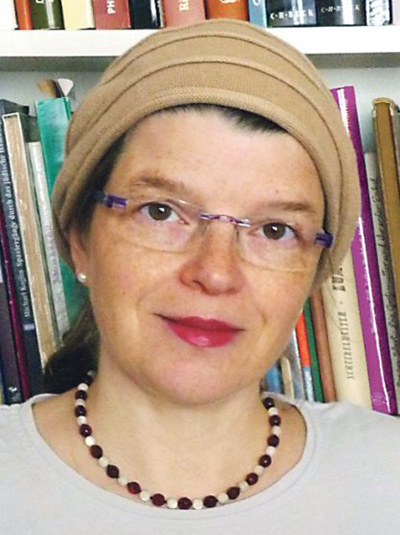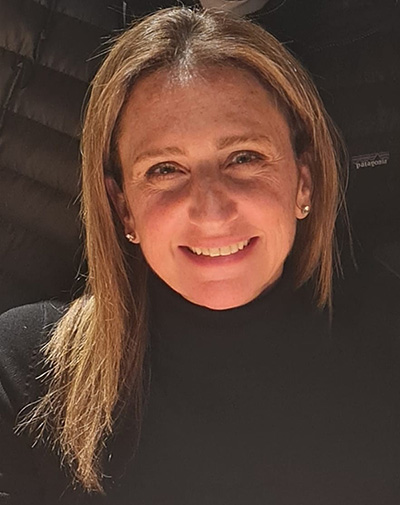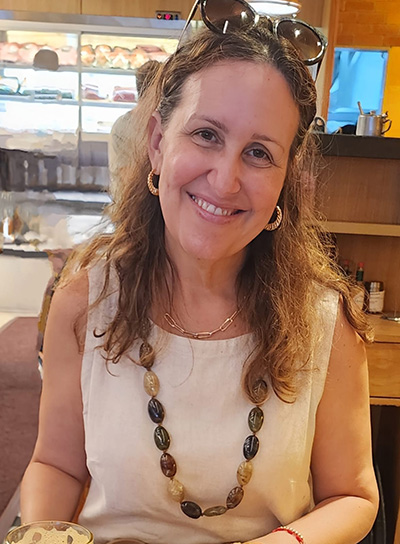

The Fifth Son, Educating the Next Generation
Gabriela Schlick-Bamberger
Headmistress, The Jeschurun Religious School, Frankfurt
 For anyone involved in Jewish education, the Passover Story – Haggadah is highly relevant because it is all about practicing the commandment- mitzvah of passing on our tradition from generation to generation. The focus of telling the story of the exodus from Egypt is all about the Jewish education – chinuch of our next generation. Our task is to instil Jewish identity and awareness in our contemporary Jewish youth.
For anyone involved in Jewish education, the Passover Story – Haggadah is highly relevant because it is all about practicing the commandment- mitzvah of passing on our tradition from generation to generation. The focus of telling the story of the exodus from Egypt is all about the Jewish education – chinuch of our next generation. Our task is to instil Jewish identity and awareness in our contemporary Jewish youth.
In particular, the portion about the four sons reflects the typical challenges of Jewish education, as they have always existed. The four sons mentioned in the Haggadah are a reflection of the children in any Hebrew school classroom. One child asks out of genuine interest. Another child shows a lack of interest in a provocative way. One student asks because he doesn’t understand. Yet another child simply doesn’t know how to ask.
Our Sages pointed out that the key to educating different types of children is to gather them together at one table or, in this sense, in one classroom. Despite our diversity, it’s through our unity that we are able to meet challenges that none of us could overcome alone. Sitting next to the interested child, the rebellious one is not destined to remain an outsider. The capable child is able to share their talents by assisting others, and in return he learns simplicity. The child who lacks understanding will acquire knowledge. The one who doesn’t yet know how to ask, will learn how to do so. Children draw strength from each other.
However, the most challenging child, as the Lubavitcher Rebbe emphasised, is the “fifth son,” the one who is absent from the seder table entirely. Unlike the four sons in the Haggadah, he does not attend the Passover-Seder and is disconnected from Jewish life and learning institution altogether. Quite often, such a child is growing up in a family far removed from any sense of Jewish identity or awareness. Reaching this child and their family requires tremendous effort. This is a responsibility not only for Jewish learning institutions but for all of us, both at the community level and on a personal level. We are called to reach out and gather these missing children, to bring them to our Seder tables and into our classrooms.
Since its founding in the 19th century, the Jeschurun School for Jewish Religious Education of the Frankfurt Jewish Community has provided Jewish education to Jewish children and youth who attend general schools. At present, we draw students from 32 different schools in and around Frankfurt. From primary to high school education, our lessons are conducted according to a government-approved curriculum and the grades acquired by our students can be added to their school report card.
However, our primary focus remains on teaching our pupils our texts as a foundation they can draw from for the rest of their lives. As a result, their knowledge will help to strengthen their Jewish identity, pride and values.
Pessach Kasher Ve’Sameach!


Passover Seder Nights
Victor Salomon Goldstein
Rio de Janeiro, Brazil
 As the nights of the Passover Seders approach – the central festive gathering filled with storytelling, wine, special foods, and tradition, we once again find ourselves thinking of new ways to engage the next generation more deeply. At the same time, we recognise that tradition guides us to repeat what has been done before, it is the foundation of our rituals and the simplest way to fulfil them. In many ways, this approach works.
As the nights of the Passover Seders approach – the central festive gathering filled with storytelling, wine, special foods, and tradition, we once again find ourselves thinking of new ways to engage the next generation more deeply. At the same time, we recognise that tradition guides us to repeat what has been done before, it is the foundation of our rituals and the simplest way to fulfil them. In many ways, this approach works.
However, the Seder should not be just a repetition of the past; it should be a living, evolving experience. This special night in our tradition offers us an opportunity, not only to recount our history but to find meaning and inspiration for the challenges of our present day.
May our Sedarim inspire us. As we pass down the stories and traditions of our parents and grandparents, may we also infuse them with new perspectives, addressing the realities of Jewish life in 2025 / 5785.
May our connection to past generations—from those who left Egypt to those who gather around our tables today, fill us with pride, inspiration, strength, and hope for a brighter future.
Chag Sameach! Wishing you success in preparing a meaningful and special Seder.


The Timeless Power of 'Next Year in Jerusalem’
Patricia Levy
France
 As a brand addict who has worked in communications for decades, reflecting on the power of the phrase “Next Year in Jerusalem” feels similar to analysing some of the most successful advertising mottos. It’s not just a religious expression, but a profound symbol that transcends generations, cultures, and time, resonating deeply with people worldwide.
As a brand addict who has worked in communications for decades, reflecting on the power of the phrase “Next Year in Jerusalem” feels similar to analysing some of the most successful advertising mottos. It’s not just a religious expression, but a profound symbol that transcends generations, cultures, and time, resonating deeply with people worldwide.
Have you ever noticed that this declaration is expressed in four words in Hebrew and in almost all Western languages as well? This gives it a universal power that transcends local cultures.
To appreciate the enduring strength of this phrase and how it has helped make Judaism the world's most timeless “brand”, let's explore it as a marketing campaign slogan similar to some of the world’s most iconic brands and successful marketing campaigns. It conveys hope and aspiration / Coca-Cola would say “Open Happiness”.
- Repeating it every year enhances the value of those who say it, creating a sense of belonging to a destiny pursued for over 3,000 years / L'Oréal would say “Because you're worth it”.
- For more than 3,000 years, this phrase has united Jews all over the world in a common destiny and committed them in the action / Nike would say “Just do it”.
- Its evocative power is so strong that no matter our degree of religiosity or Emunah- Faith, we all imagine the same image: The sun rising over Jerusalem, casting golden light across iconic landmarks. Its warm rays illuminate the Judean hills and the Western Wall, as the city basks in the glow of dawn. This image, deeply ingrained in our collective memory serves as a powerful symbol, much like the De Beers tagline “A diamond is forever”.
- Finally, the belief that the goal is reachable, against all odds, strengthens the identity of those who proclaim it / Apple would say “Think different”.
And what do we do with a powerful tradition that we love and that moves us? We pass it on from generation to generation.... Just as my grandfather passed on his commitment to supporting Israel to my father, who passed it on to me, and as I do for my children and grandchildren.
As we reflect on the power of enduring messages, it’s clear that supporting Israel remains as relevant today as ever. Just as generations have passed on a deep connection to our heritage, our commitment to Israel continues to be timeless and enduring.
It’s always the right time to support Israel.
Pessah sameah to all of you.


Freedom Then, Freedom Now: A Passover Reflection
Yemy Sirazi
Chair, Israel Bonds Women’s Division, Mexico
 Each year, as we gather around the Seder table, we retell the story of our ancestors’ exodus from Egypt. A journey from slavery to freedom, from darkness to light, from despair to hope. It’s a story we know well, yet every Passover, it stirs something new within us. It invites us not only to remember but also to reflect. What does freedom truly mean to me here and now?
Each year, as we gather around the Seder table, we retell the story of our ancestors’ exodus from Egypt. A journey from slavery to freedom, from darkness to light, from despair to hope. It’s a story we know well, yet every Passover, it stirs something new within us. It invites us not only to remember but also to reflect. What does freedom truly mean to me here and now?
In the time of the Exodus, freedom meant escape from physical bondage. But today, freedom can mean something deeper and more personal. It means the ability to live as Jews without fear, to speak our truth, to educate our children in our values, to love openly, to act with purpose, and to contribute to building a better world. But freedom also means responsibility. The freedom we cherish today did not appear overnight. It was earned through courage, resilience, and faith. And it must be protected, nurtured, and passed on.
Freedom is more than escaping oppression, It’s the courage to build something new. For our ancestors, it meant shaping a nation from nothing. For us, it’s the challenge of preserving our identity in a world that often pulls us in a thousand directions. It’s about holding onto who we are proudly, visibly and lovingly even when it’s hard. Especially when it’s hard. Today, as a woman, a mother, and chair of Israel Bonds Women’s Division in Mexico, freedom means having a voice and using it.
At the end of the Seder, we rise and say together: L’Shanah Haba’ah B’Yerushalayim — "Next year in Jerusalem." This is more than a phrase; it’s a prayer, a promise and a declaration of hope. For me, it’s a reminder that our journey is not yet complete. Whether we interpret it spiritually, physically, or emotionally, Jerusalem represents a dream of unity, peace, and homecoming. A place where our past, present, and future meet. It’s a declaration of connection to our people, our heritage, and to the land of Israel.
Jerusalem is the place where our identity is rooted, where our history lives, and where our collective future takes shape. It symbolizes the freedom to belong, to return, and to remain united, no matter where we are in the world.
This Passover, as we retell the story of liberation, may we also renew our commitment to building a world where freedom, in every sense of the word, is possible for all. This year, that commitment feels deeply personal. While we rejoice for those hostages who have returned home, our hearts remain broken for those still held in captivity. Their empty seats at the Seder table are a painful reminder that our story of redemption is not yet complete.
We raise our voices with one clear demand: bring them all home, alive, safe, and whole, to reunite with their families. Am Israel Chai
Wishing you and your loved ones a meaningful, peaceful, and liberating Pesach. Chag Sameach


Where Freedom Lives and Thrives in Israel
Zara Landesberg
United Kingdom
 As another seder approaches, many of us find ourselves contemplating the timeless and profound concept of freedom. Perhaps more so than in previous years, I find myself reflecting on the various dimensions of freedom, its complexities, its struggles, and its sacrifices. Freedom from captivity, freedom from an oppressive regime, freedom from the devastating pain of losing innocent men, women, and children, or from the unbearable anguish of uncertainty, of not knowing whether our loved ones will ever return home or remain lost forever.
As another seder approaches, many of us find ourselves contemplating the timeless and profound concept of freedom. Perhaps more so than in previous years, I find myself reflecting on the various dimensions of freedom, its complexities, its struggles, and its sacrifices. Freedom from captivity, freedom from an oppressive regime, freedom from the devastating pain of losing innocent men, women, and children, or from the unbearable anguish of uncertainty, of not knowing whether our loved ones will ever return home or remain lost forever.
It’s easy, in our modern world, to focus on freedom from prejudice, especially when we witness the response of a shockingly high proportion of the global community to a nation that is simply defending itself against the threat of terrorism. But this year, as we sit together at the seder table, I am thinking about a different aspect of freedom, one that is often overshadowed by conflict and division, but one that is just as significant: the freedom that Israel offers to her citizens, regardless of race, religion, gender, or sexual orientation.
In Israel, the opportunity for different cultures, ethnicities, and religions to not only coexist, but to thrive together in daily life, in the workplace, and even in the highest levels of government, is a testament to what can be achieved when a society makes freedom and equality a foundational principle. This remarkable diversity is not merely tolerated, it is celebrated. It is a living example of what a true democracy can look like in practice, where every citizen, no matter their background, is granted the right to live freely, pursue their dreams, and contribute to the nation’s future.
Israel’s commitment to this ideal should not just be defended, it should be nurtured and protected. This freedom, this inclusive spirit, is not a given; it is something that needs constant care and support, so that the beacon of hope Israel represents can shine brightly enough for the world to see what real progress looks like. When we look around at the challenges the world faces—rising intolerance, growing divisiveness, and increasing violence, it becomes even more crucial to hold onto and champion the values that make Israel such a unique and inspiring place.
As we gather together to retell the story of our exodus from Egypt, let us also remember that freedom is not only about escaping oppression. It’s about the ongoing fight to protect and expand the spaces where all people, regardless of their differences, can live with dignity and respect. Israel is a symbol of this aspiration, a beacon for the future of a world that desperately needs to embrace tolerance, justice, and peace.
I wish all of you a meaningful and joyous Passover. May the lessons of freedom continue to guide us all.
Bring them home now.
Am Yisrael Chai.Top of FormBottom of Form


Holding Onto Freedom Through Every Challenge
Karina Joseph Levy
Sao Paulo, Brazil
 Thousands of years ago, we were freed.
Thousands of years ago, we were freed.
We broke the chains of slavery and walked out of Egypt, forging our path toward freedom. But that journey was not without struggle, countless trials stood between us and liberation.
Once again, in October 2023, we were forced to confront darkness. Once again, we found ourselves a vulnerable minority, facing hatred and violence. Once again, we find ourselves forced to prove, over and over, that we are good, that we deserve to live in peace, as if our right to peace were conditional.
And yet, despite it all, we stand firm. We keep fighting for what we have always sought: Freedom. Peace. Life.
We are Jews, and we are proud.
This Passover, our greatest hope is for the 59 hostages to return home. May this nightmare finally end. May we live with the dignity that is our right.
May good triumph over evil.
Chag Pesach Sameach! Am Yisrael Chai!
